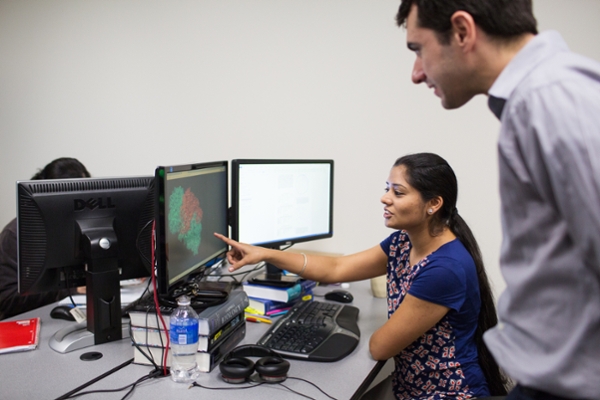How Our Immune Systems Learn to Defend: An IS&T Faculty Member Investigates
As an assistant professor of Biomedical Informatics at the University of Nebraska at Omaha College of Information Science and Technology with a background in Medicine and Bioinformatics, Dr. Dario Ghersi has a rich history in human health and data analytics. Recently, his research was published in the prestigious Nature Structural and Molecular Biology publication, one of the premier journals in his field.
- contact: Amanda Rucker
- email: arucker@unomaha.edu

The research, “Broad TCR repertoire and diverse structural solutions for recognition of an immunodominant CD8+ cell epitope,” explores molecular aspects of anti-viral immune response.
“We’ve been investigating the fact that the immune system is actively shaped by the history of previous infections,” Dr. Ghersi said. “Past exposure to a virus can affect the way the immune system responds against an unrelated virus in the future. For example, if someone has the flu virus a few years prior, it can affect how their immune system responds against the virus that causes mono later on.”
Dr. Ghersi explained that the immune system can learn from past viral attacks and perform better, but the immune system also can “think” it knows how it should attack a virus based on past experiences and completely miscalculate its response and underperform.
“The traditional concept of immunological memory, exploited in useful ways by vaccines, is that having previous exposure to a virus will make our immune system respond more effectively the next time the virus come around,” he said. “However, when the viruses are unrelated, having that kind of reaction can be good but also bad, depending on the circumstances.”
When an immune system responds correctly, the virus is cleared quickly and lasting immunity is established. However, an immune system can also miscalculate its attack based on previous experiences with other viruses, and not attack a virus quickly or with enough strength. His research works to shed light on the molecular and structural mechanisms of the immune recognition of pathogens.
Working with his collaborators at the University of Massachusetts since 2004, Dr. Ghersi says he’s seen technology in his field evolve. This expands the kind of work that can be done and creates a more pressing need for computational analysis of the data, which is where he comes in.
“I helped with analyzing large volumes of sequencing data and summarized the data in a clear way,” Dr. Ghersi explained. His background in Bioinformatics allowed him to know how to automate the process of handling large quantities of data, and his medical knowledge helped him summarize the results in a biologically relevant way.
“I could not do this research without my programming skills,” Dr. Ghersi said, pointing out the need for more biomedical informatics professionals in the medical field.
Be sure to check out Dr. Ghersi’s published paper in Nature Structural and Molecular Biology.